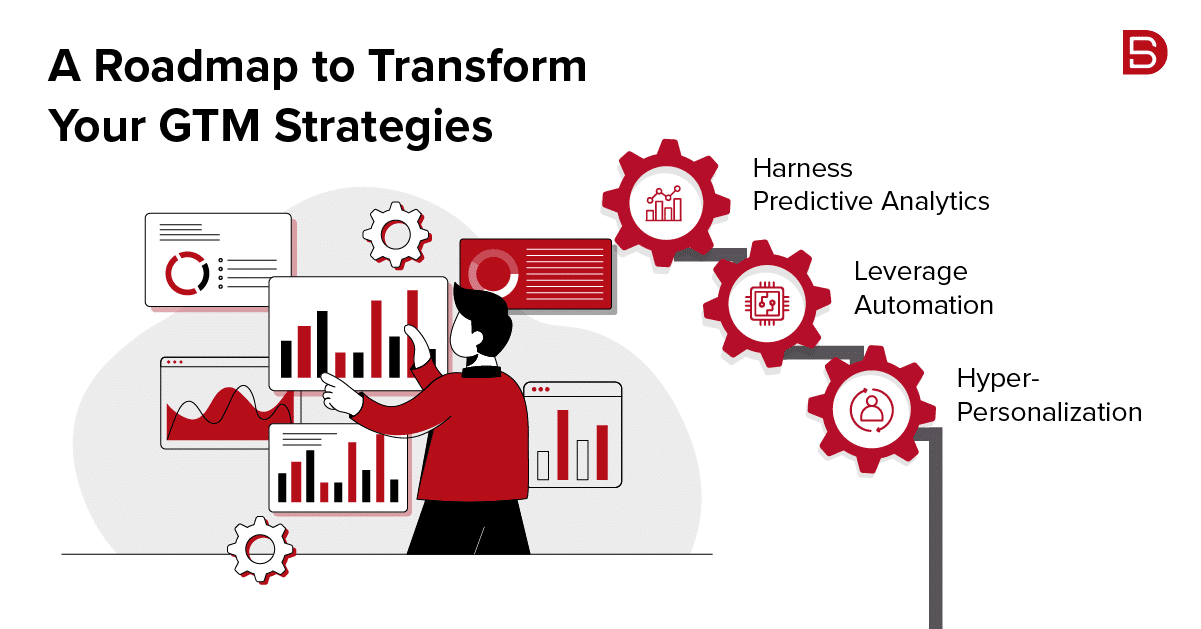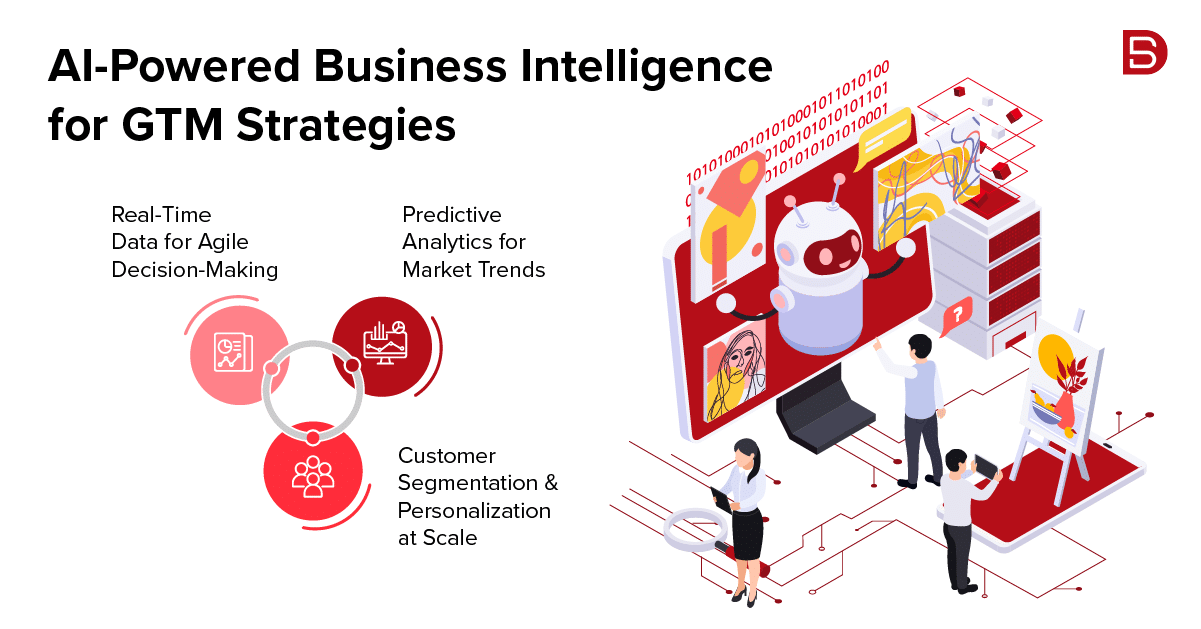In the fall of 2022, the swift emergence of artificial intelligence (AI) captured widespread attention with the introduction of ChatGPT. Since then, the landscape has changed significantly. Although still in its early stages, AI has begun transforming the world. Nearly 10,000 AI-enabled tools are now available in the market, developed by both small startups and large enterprises. If you have a specific use case, there’s likely an AI-powered solution already out there, highlighting its extensive reach.
The sales and marketing sectors have also been influenced by this AI transformation, with almost every business claiming to utilize or adapt AI to enhance their go-to-market (GTM) strategies. A recent McKinsey article noted that businesses employing AI have experienced revenue increases ranging from 3% to 15% and improvements in sales return on investment (ROI) between 10% and 20%.
As companies explore the potential for creating highly effective GTM strategies through advanced AI and business intelligence, examining how business intelligence is reshaping these strategies is essential. To adapt to an AI-driven marketplace, businesses must consider specific actions they can take. So, before you invest another dollar in your GTM strategies, here are some insights to help you maximize the ROI on your sales and marketing efforts.
Understanding GTM Strategies in the Age of AI
As a B2B marketeer, we all are well-versed in what an effective GTM strategy is and how you need to outline it to maximize its reach among the target customers and achieve a competitive advantage. A holistic GTM strategy encompasses everything from product development and pricing to marketing, sales, and distribution.
But now, with AI in the frame, the GTM strategies of the past seem like a relic to modern marketers. They take a minimal data-driven approach and even less use advanced machine learning and data analytics tools to maximize their effectiveness. So, if you want to tweak your GTM strategies to make them more suited to the modern AI era using business intelligence, here’s a detailed roadmap.
A Roadmap to Transform Your GTM Strategies
Harness Predictive Analytics
Advanced predictive analytics have allowed marketers to accurately forecast market trends and customer behavior based on every business’s historical data sets. This information helps them tailor their campaigns perfectly to evolving market needs and consumer behavior.

Leverage Automation
Data collection and reporting can consume significant time from your everyday marketing routine. However, leveraging advanced automation tools and platforms allows you to easily automate these repetitive tasks and regain enough time to focus on your growth initiatives.
Hyper-Personalization
Hyper-personalization is the need of the hour, with every modern marketeer tailoring their marketing and sales efforts to suit every individual’s preference. With the deep insights delivered by advanced AI-powered marketing tools, you get the information pertinent to every customer and their preferences, making it easy to customize your offering and messaging to resonate with them and consequently boost the chances of their conversation.
With the enormous computational power of AI-powered tools, businesses can move beyond traditional, linear GTM frameworks and adopt dynamic, adaptive strategies that respond to real-time data.
AI-Powered Business Intelligence for GTM Strategies
With the advancements in artificial intelligence, we continue to see highly sophisticated tools and platforms empowering businesses to formulate highly impactful GTM strategies. Some of the most glaring examples of AI-powered business intelligence helping companies to form effective GTM strategies include –

Predictive Analytics for Market Trends
AI-powered BI tools give businesses the computational power to analyze substantial historical data sets for accurately predictive market trends and consumer behaviors. This allows companies to leverage predictive analytics to estimate demand, identify potential challenges, and optimize pricing strategies.
Customer Segmentation and Personalization at Scale
With the growing demand for personalization, the need for proper customer segmentation is higher than ever. Artificial intelligence allows organizations to easily segment their audience based on behavior, preferences, and demographics. As a result, they can create highly personalized marketing campaigns that resonate with individual customers, increasing engagement and conversion rates.
Real-Time Data for Agile Decision-Making
Every business today claims to be agile, and with real-time insights provided by AI-driven BI, they can be. These insights allow companies to adjust their GTM strategies on the fly. For instance, real-time data can help identify the issue and guide corrective actions if a marketing campaign isn’t performing as expected.
The Building Blocks of AI-Powered GTM Strategies
Smart Market Research, Backed by Data
With the vast computational power of AI-powered tools, you now have the power to gather and analyze massive datasets from multiple sources, such as social media, customer reviews, and industry reports. The insights gathered by analyzing these vast data sets help you understand the market comprehensively, enabling you to make data-driven decisions.
Real-Time Competitive Intelligence and Benchmarking
Modern business intelligence tools can monitor market trends and competitors in real time. This helps you identify any possible gap in your product/service offering and fix it in real time. These insights are also instrumental in crafting effective GTM strategies.
AI-Powered Sales and Marketing Alignment
One of the major concerns of modern organizations is the lack of alignment between their sales and marketing teams. With AI-powered business intelligence, you now get unified insights and data points to get everyone on the same page. This automatically improves collaboration, reduces inefficiencies, and boosts the overall effectiveness of GTM strategies.
With these building blocks in place, you can easily transform your GTM strategies into dynamic data-powered growth engines.
The Road Ahead for AI-Powered GTM Strategies
While we still do not have adequate data to accurately predict the road for AI-powered GTM strategies, if we are to put our bets on trends that actually will shape the world of GTM in coming years, it will be
Hyper-Personalization
In the coming years, we will see an increasing number of AI-powered recommendation engines surface, enabling B2B marketers to leverage the power of real-time personalization and dynamic content. Both will allow them to tweak their strategies and reap the growth benefits.
AI-Powered Predictive Sales & Marketing Intelligence
With the growing influx of customer-generated data, AI models are strengthening daily. These models will eventually be able to predict market trends and customer demands accurately, even before they arise. This will help the sales and marketing teams harness the power of data-driven prediction and gather deal-closing insights.
Conclusion
The AI era in the GTM world has just begun with minor yet promising signs of transformation using business intelligence, customer insights, and automation, all indicating a hopeful tomorrow. As a business gearing up for tomorrow, you must kickstart adopting AI for your GTM strategies to stay ahead of the competition with cutting-edge market research and AI-driven insights.
At Datamatics Business Solutions, we work with small and large businesses across industries, enabling TAM expansion and strategic growth through our AI-powered GTM strategies. If you’re looking to accelerate your business growth with GTM, write to us at marketing@datamaticsbpm.com, and we will have our business intelligence experts reach out to you to understand your business needs and tailor a solution to match your business needs.

Somnath Banerjee


